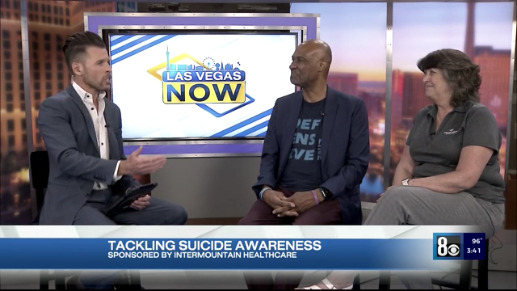Suicide is major issue and especially in Nevada as the state ranks 9th in the country for suicide deaths. It is also the 9th leading cause of death in Nevada and the second leading cause of death for kids aged 10 to 24 nationwide. These statistics were gathered by AFSP.
Intermountain Healthcare has made suicide prevention as one of the major community health goals. This includes utilizing mental health integration. Mental health has a big effect on physical health — and vice versa. Mental Health Integration (MHI) is an approach to healthcare that focuses on both. One team — led by your doctor — cares for your mental and physical health needs. And it all happens right in your doctor’s office.
Intermountain has also worked to educate on QPR training – question, persuade, refer for suicidal risks. Most of the time, it is about putting time between the crisis and the person at risk. Such as limiting access to lethal means such as firearms and dangerous medications. In Nevada, 68% of firearm deaths were suicides. 62% of all suicides were by firearms.
About The Defensive Line
Solomon Thomas is a defensive lineman who has played for the San Francisco 49ers, was a fan favorite here for the Las Vegas Raiders last season and recently signed with the New York Jets. Off the field, Solomon and his parents, Chris and Martha, endured unimaginable heartbreak when Solomon’s big sister Ella died by suicide.
Solomon and his parents have dedicated their lives to sharing Ella’s story and turning their pain into purpose. Out of their loss, they formed The Defensive Line with the mission: To end the epidemic of youth suicide, especially for young people of color, by transforming the way we communicate and connect about mental health.
The Defensive Line provides suicide prevention training in Las Vegas and nationally to educators, coaches, and other leaders of young people, and awareness and other education efforts through sharing their story and the stories of others who have lived experience of mental health, mental illness, or survived or lost someone to suicide. Their efforts include:
- Educating adults about youth suicide and their unique opportunities for connection and support with the students in their care.
- Increasing language and conversation skills to talk about suicide and mental health.
- Creating safe places for young people to be honest and vulnerable with the adults that serve them.
- Expanding partnership approaches within schools to better prevent suicide systematically and improve access to resources.
Chris Thomas said he hopes to get this message to vulnerable populations, particularly all youth of color in which suicide rates are rising at alarming rates. According to the CDC, Black youth suicides are rising at 2 times the rate than other ethnic groups. American Indian and Alaskan Natives are also seeing rising suicides at 2 and half times the rate as well.
The Defensive Line is working to get into the schools, teams and other areas that can help spread the message of hope and how adults support the mental health of young people in their care
What can you do?
Take action if you are worried about someone, talk to your family and friends about stressors and check in on them as well. Ensure that you have secured any firearms or medications safely and away from access for someone at risk Please reach out to your family doctor, therapist if you need to mental health resources.
Please call the National Suicide Prevention Lifeline at 800-273-8255.
Or contact the Crisis Text Line by texting TALK to 741741 or reach them at #988. The Trevor Project offers help for LGBTQ+ youth.

